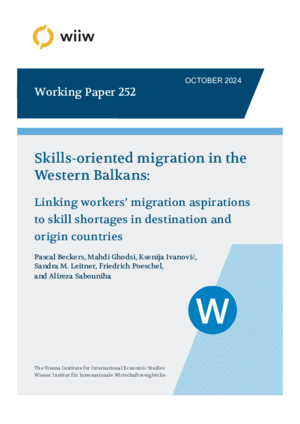Skills-oriented migration in the Western Balkans: Linking workers’ migration aspirations to skill shortages in destination and origin countries
Pascal Beckers, Mahdi Ghodsi, Ksenija Ivanović, Sandra M. Leitner, Friedrich Poeschel and Alireza Sabouniha
wiiw Working Paper No. 252, October 2024
43 pages including 12 Tables and 1 Figure
This paper examines the impact of labour shortages on migration aspirations and destination preferences among individuals from Albania, Bosnia and Herzegovina, and Serbia. Using a two-stage Heckman selection model, we analyse data from the OeNB Euro Survey and the World Bank’s STEP Measurement Program. The results indicate that labour shortages significantly influence migration decisions: individuals are more likely to aspire to migrate if there is a shortage of workers in their occupation in the aspired destination countries, while shortages in their home country reduce migration aspirations. These findings suggest that both origin and destination countries should consider labour market conditions when formulating migration policies. For destination countries, highlighting demand for specific skills can attract needed workers, while Western Balkan countries should address the education-labour market mismatch to mitigate local shortages. Policy co-ordination between regions is crucial to manage migration flows and address skill gaps without exacerbating local shortages.
Keywords: migration drivers, migration aspirations/desires, destination decision, choice model
JEL classification: F22, O15
Countries covered: European Union, SEE
Research Areas: Labour, Migration and Income Distribution
